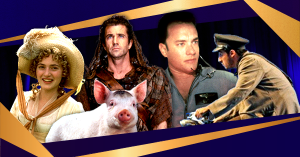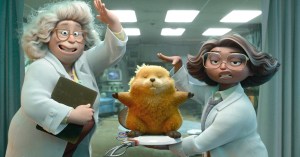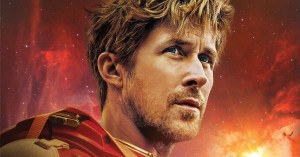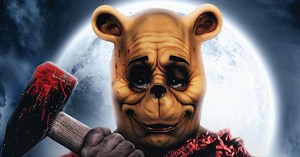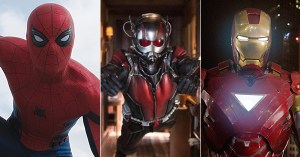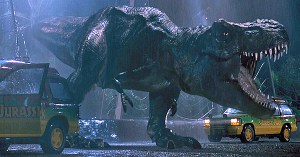Total Recall: Don Cheadle’s Best Movies
We count down the best-reviewed work of the Iron Man 2 star.

Eighteen years ago, Don Cheadle was trading quips with Betty White in the short-lived Golden Girls spinoff The Golden Palace. Today? He’s getting ready to step into a high-tech suit of armor and do summer blockbuster battle as James “Rhodey” Rhodes in Iron Man 2. Along the way, Cheadle has filmed a number of critically acclaimed roles, produced successful films, campaigned for human rights, and even co-authored a book, all while moving between comedy, drama, and action. This week, we celebrate all this success by spinning the dials on the Tomatometer and looking back at Don Cheadle’s ten best-reviewed films. It’s time for Total Recall!
10.
Though he’s often appeared as part of ensemble casts, Cheadle has occasionally had the opportunity to take the spotlight for himself — as with 2007’s Talk to Me, which dramatized the life of radio host and Emmy-winning television personality Petey Greene. Though his fame was mostly restricted to the Washington, D.C. area, Greene was an influential figure for many years, using his gift of gab and inspirational journey from prison to the airwaves as the building blocks for a career that earned him acclaim, a visit to the White House (where he famously joked he stole a spoon), and the admiration of followers such as Howard Stern. It wasn’t a huge hit, and members of Greene’s family criticized its historical inaccuracies, but as far as most critics were concerned, Talk to Me was well worth watching. As Neil Smith wrote for Total Film, “If the picture doesn’t ultimately live up to the raw vitality of Cheadle’s performance, it remains an uplifting snapshot that broadcasts its message with zero distortion. Tune in and you won’t be turned off.”
9.
Cheadle teamed up with director Steven Soderbergh for the third time with 2001’s Ocean’s Eleven, a remake of the 1960 Rat Pack heist classic that united some of Hollywood’s biggest actors for no purpose greater than the simple thrill of watching impossibly good-looking people steal from other good-looking people in an unbelievably glamorous setting. It sounds shallow, and it is — but it’s also a heck of a lot of fun, as evidenced by the $450 million it grossed amidst generally bemused reviews from critics who couldn’t help but appreciate a well-made, tuxedo-clad caper flick. For Eleven — as well as its two sequels — the Kansas City-born Cheadle got to strap on a Cockney accent for the role of explosives expert Basher Tarr, a part that made up in funny lines (and earth-shaking stunts) what it lacked in screen time. Summing up its appeal in his review for Bullz-Eye, David Medsker wrote, “We’re not talking about reinventing the genre here. This is just a Big Mac and fries of a movie, and those movies, like the food, can hit the spot sometimes, especially when you’re hung over.”
8.
It wasn’t his first role in a major film, but Cheadle’s appearance in 1988’s Colors — as Rocket, the ill-fated Crips leader who crosses paths with LAPD Detectives Bob Hodges (Robert Duvall) and Danny McGavin (Sean Penn) — was definitely an early breakthrough. (That gig he scored on Richard Grieco’s Booker in 1989? Totally wouldn’t have gotten it without Colors.) Its tale of warring gangs in 1980s Los Angeles might seem a little tired now, but in its day, this Dennis Hopper-directed drama was actually sort of groundbreaking — and it boasted a terrific soundtrack, too, including the hit title track, performed by Ice-T. (Yes, kids, before his Law & Order days, he was a rapper.) The film earned widespread praise from critics such as Roger Ebert, who wrote, “Colors is a special movie — not just a police thriller, but a movie that has researched gangs and given some thought to what it wants to say about them.”
7.
Director John Singleton snapped a critical dry spell with 1997’s Rosewood, a harrowing dramatization of 1923’s shameful Rosewood massacre, during which the residents of a primarily black Florida town were attacked by whites from a neighboring city, setting off days of horrific racial violence that culminated in Rosewood’s total abandonment. It’s the kind of episode any country would rather forget — and forget it most Americans did, for decades. Rosewood capped a 15-year period when the tragedy was rediscovered, first by journalists, then finally by the politicians who authorized reparations for its survivors. As Sylvester Carrier, a piano teacher who watches helplessly as the violence engulfs his home, Cheadle brings a nuanced performance full of palpable sorrow and defiance to a film that occasionally strays into — pardon the phrase — black and white. Unfortunately, most filmgoers weren’t interested in reliving this dark chapter in our history, and Rosewood left theaters a commercial failure — though not for want of positive reviews from critics like Jose Martinez of Boxoffice Magazine, who wrote, “Comparisons to today’s society can’t help but be made while watching Rosewood; although moviegoers might wish to leave the theatre thinking we are living in a better time, they might not be able to.”
6.
In a career dotted with scene-stealing turns, Cheadle’s performance as the violent Mouse Alexander in Devil in a Blue Dress borders on the larcenous — which is saying quite a bit, given how comfortably the film’s star, Denzel Washington, fit into his starring role as detective Easy Rawlins. Matter of fact, director Carl Franklin’s adaptation of the Walter Mosley novel was strong all around, as attested by its healthy 90 percent Tomatometer rating; this slice of immaculately fedora-ed neo-noir may not have caught on with filmgoers, but for critics like the Washington Post’s Hal Hinson, it was nothing short of “First-rate American pulp — fast, absorbing and substantive.” Amidst all the critical praise for Devil in a Blue Dress, Cheadle earned an impressive number of nods all his own, including Best Supporting Actor awards from the Los Angeles Film Critics Association and the National Society of Film Critics. As Todd McCarthy wrote in his review for Variety, “Entering the main flow of the story relatively late, Don Cheadle steals all his scenes as a live-wire, trigger-happy old buddy of Easy’s from Texas.”
5.
Cheadle reunited with his Out of Sight director, Steven Soderbergh, for this sprawling two hour-plus drama about the drug trade, adapted from the BBC series Traffik. Part of a huge ensemble cast that included Michael Douglas, Catherine Zeta-Jones, and Benicio del Toro, Cheadle played a DEA agent who locks horns with a San Diego drug dealer (Steven Bauer) and his boss (Benjamin Bratt). Cheadle’s segment, one of three interweaving stories, underscored the sadness and loss at the heart of the War on Drugs with solid acting and some sharp visual style from Soderbergh. Traffic was rewarded with a healthy $207 million worldwide gross and four Academy Awards — including Best Director for Soderbergh and Best Supporting Actor for Del Toro — along with a wave of positive reviews from critics like Netflix’s James Rocchi, who declared, “Simply put: This is the best American film since The Godfather.”
4.
An outspoken humanitarian, Cheadle took the opportunity to bring his convictions to the big screen with director Terry George’s Hotel Rwanda, which told the true story of Paul Rusesabagina, a hotelier who used his position to save the lives of over 1,200 refugees during 1994’s Rwandan genocide. It’s an incredible tale, full of gripping drama — and for American filmgoers who tuned out during news coverage of the slayings, it was a horrifying glimpse of persecution in a much more unstable corner of the globe. During its limited run, Hotel Rwanda earned some of the year’s best reviews, as well as Oscar nominations for Cheadle, his co-star Sophie Okonedo, and screenwriters Terry George and Keir Pearson; more importantly, it helped raise money for the International Fund for Rwanda. “Despite the shocking realities,” wrote Charlotte Weekly’s Sean O’Connell, “you’ll leave Rwanda discussing one positive above all the negatives, and that’s Cheadle’s tremendous performance.”
3.
How do you take a movie about a porn star with a famous appendage and turn it into Oscar bait? You write a knockout script, of course — and then you cast your film with a crowd of stellar character actors, including Burt Reynolds, Julianne Moore, John C. Reilly, William H. Macy, Philip Seymour Hoffman, and, of course, Don Cheadle. As the part-time porn actor and hi-fi enthusiast Buck Swope, Cheadle helped leaven some of Boogie Nights‘ darker moments, and his character’s ultimate fate in the final act gave audiences a crucial reminder that sometimes, all that stands between you and your dreams is a well-timed purchase at the neighborhood donut store. Though far from Cheadle’s biggest role, it was certainly a part of the reason that critics like Owen Gleiberman of Entertainment Weekly declared that “Boogie Nights, an epic tale of porn, pleasure, and excess, offers a purer hit of exhilaration than any movie this year.”
2.
What you most likely remember about Out of Sight is the steamy interplay that develops between escaped convict Jack Foley (George Clooney) and U.S. Marshal Karen Sisco (Jennifer Lopez) as Foley tries to swindle a stash of diamonds out of a former associate. But it isn’t just trying to keep ahead of Sisco that keeps Foley moving — he’s also racing against the menacing Maurice “Snoopy” Miller (Cheadle), an ex-con whose cartoonish nickname belies his propensity for decidedly unfunny violence. In a movie peppered with bad guys you love to root for, Cheadle is the one you actually have to root against — but he’s so much fun, you almost wish things were different. As part of a supporting ensemble that included Ving Rhames, Steve Zahn, and Albert Brooks, Cheadle was an important part of the reason Roger Ebert called Out of Sight “Steven Soderbergh’s best film since Sex, Lies and Videotape a decade ago.”
1.
Fresh out of college, Don Cheadle headed for Hollywood to take his shot at the big time, with $500 from his parents to help him get his start. It’s a common story, and one that’s usually followed by a whole lot of struggle and disillusionment. For Cheadle, however, the next step was John Irvin’s Hamburger Hill, a 1987 Vietnam War drama that gave audiences an unblinking, soldier’s-eye view of the conflict. Part of a cast of young future stars that included Steven Weber, Dylan McDermott, Courtney B. Vance, and Michael Boatman, Cheadle took the role of Private Johnny Washburn, a new recruit who comes in after his regiment’s point man is killed in action. Though Cheadle’s part isn’t as large as you might expect if you purchase one of the later editions of the film — the 20th anniversary edition DVD actually puts his name above the title — it’s a terrific early example of his talent in action, and an inspiration to young actors dreaming of that one big break. Plus, it’s a pretty terrific war movie: As Noel Murray wrote in his review for the AV Club, “Hamburger Hill stands out from the pack as one of the best of the Vietnam movies.”
In case you were wondering, here are Cheadle’s top ten movies according RT users’ scores:
1. Hotel Rwanda — 95%
2. Ocean’s Eleven — 94%
3. Boogie Nights — 94%
4. Traffic — 91%
5. Rosewood — 88%
6. Reign Over Me — 86%
7. Colors — 86%
8. Crash — 85%
9. Talk to Me — 83%
10. Ocean’s Thirteen — 82%
Take a look through Cheadle’s complete filmography, as well as the rest of our Total Recall archives. And don’t forget to check out the reviews for Iron Man 2.
Finally, here’s a behind-the-scenes look at the making of Traitor:











